Peru Highway Department seeks cost savings and a cleaner environment
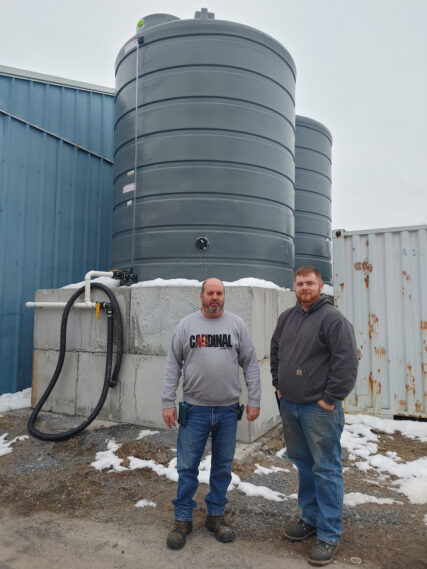
Mike Farrell & Tyler Jarvis and the town’s two brine storage tanks
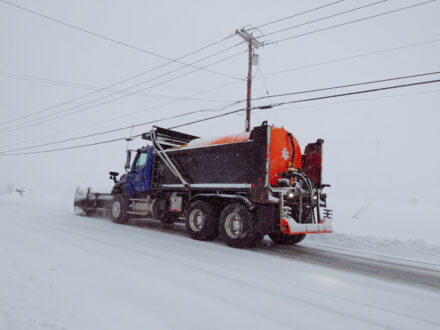
The Brine Truck
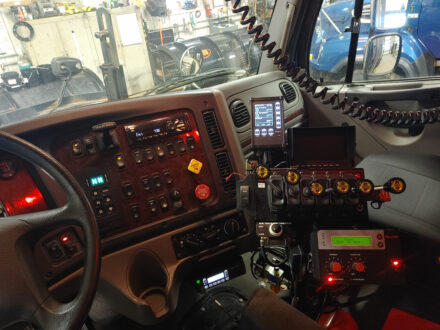
Inside a plow truck. Looks more like an airplane cockpit.
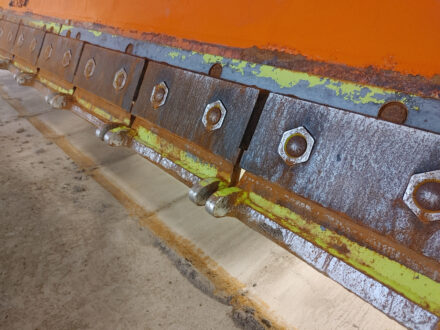
Live Edge Plow Blades with independent suspension
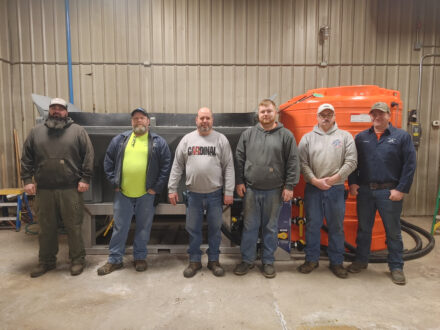
Plow Crew L-R Adam Archer, Tom Rock, Michael Farrell, Tyler Jarvis, Wayne Wells, Andrew McLaughlin
By Marque Moffett
What do you get when you mix some elbow grease, lunchtime Googling sessions, science, ingenuity, math, and a few training workshops? According to Peru Highway Superintendent Mike Farrell, when the mix happens at Peru’s Highway Department, you get considerable savings to taxpayers and significant environmental gains.
Mike Farrell and Deputy Superintendent Tyler Jarvis shared the full story of their new winter road care procedures at this month’s Community Learning Series event. Using a combination of four new technologies: salt brine, live edge plow blades, salt trackers, and temperature sensors, the Town Highway Department has been able to cut salt use dramatically and is on track to save taxpayers $70,000 – $73,000 in this, the first year of using the new system.
At the fundamental level, salt brine and road salt work similarly; they lower water’s freezing point, making it stay liquid at colder temperatures. Salt brine, however, has a few advantages that are of value for use on winter roads. Because brine is sprayed as a dilute solution, it is more targeted; it spreads out more evenly than rock salt and melts ice and snow more consistently.
So far this year, Peru’s highway crew has outfitted one plow truck with a brine sprayer. You can spot it easily, as it has a bright orange tank in the truck box. That truck uses brine to pretreat all the 55 mph roads and the streets in the village. Pretreating helps minimize ice formation on roadways and makes it easier for plows to clear roads during storms.
The highway crew has also made important upgrades to the town’s other plows, including installing sensors that display air temperature, road temperature, and salt use for the plow driver, as well as a new type of leading edge for the plow blades. The new edge, called a live edge, consists of short carbide steel blades that can move up and down, following the road’s contours. The blades enable the plow to do a much better job clearing pavement than a traditional solid straight-edge plow blade.
Before installing all this equipment on our plows, our trucks spread 600+ pounds of salt per mile. In perspective, that would be fifteen 5-gallon buckets of salt on every mile of town road. Now, after working carefully to calibrate everything over the winter season, our trucks have reduced their salt use to 215 pounds per mile. That’s only a little more than five 5-gallon buckets per mile.
These remarkable savings are due to the teamwork of Peru’s Town Highway crew. Mike says his current crew is relatively young and has fully embraced the challenge of getting this program up and running. Together, they have attended training sessions, learned a lot of new science and math, and learned how to install new equipment. The highway crew takes pride in doing an excellent job for the town and doing their best to save the community money despite the continuous increase in costs their department faces every season.
As Mike and his crew work to improve this system, they will be looking to expand their capability to store salt brine by purchasing a larger storage tank. Doing so will enable them to expand salt brine into more of their range, cutting back even further on rock salt. They will also install solar-powered sensors on their plow routes’ remote stretches. Those sensors, already in the hands of the highway crew, will send road and air temperatures and air moisture data to the department employees, enabling more efficient use of highway department resources. Mike Farrell will discuss his plans at upcoming Peru Town Board meetings.
The Community Learning Series is a monthly event organized by the Peru Democratic Committee. Events focus on “under the hood” information about how our town works and are open to everyone, regardless of voter registration and town residence.
Posted: March 13th, 2023 under Community Events, Environmental News, General News, Highway Dept. News, Northern NY News, Peru Library News, Peru/Regional History, Town Board News.
